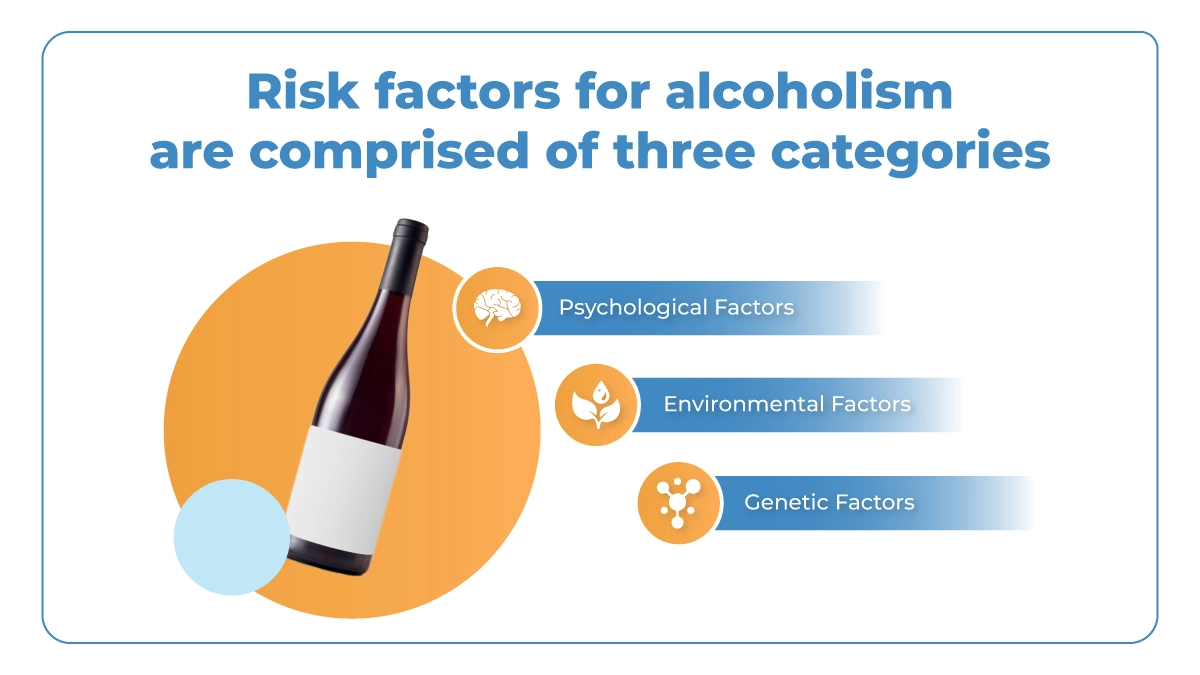Tackling the Roots: Risk Factors Behind Alcoholism
Alcoholism, a chronic disorder, involves excessive and compulsive consumption of alcohol despite adverse effects. This condition disrupts daily life and may lead to severe health issues.
Several risk factors contribute to the development of alcoholism, including genetic predisposition, environmental influences, and mental health conditions.
Additionally, mental health disorders like depression or anxiety can contribute to alcoholism. This article explores these factors in depth, vital for prevention and intervention.
Key Takeaways
Various risk factors can lead to alcoholism. Here’s what you need to know:
- Family history significantly influences the risk of alcoholism, with specific genes impacting how the body metabolizes alcohol, contributing to susceptibility.
- Social surroundings, accessibility, and cultural norms play a pivotal role in alcoholism risk.
- Mental health intricacies, including conditions like depression and anxiety, increase the risk of alcoholism.
- Learning the interplay between psychological traits, emotional disorders, and alcohol use is vital for prevention and intervention.
The Recovery Team provides compassionate and personalized support, guiding individuals on their journey to overcome addiction and achieve lasting recovery. Contact us at (800) 817-1247 for more information.
Alcoholism: Understanding the Concept
Understanding alcoholism involves recognizing terms such as alcohol use disorder and alcohol abuse. It also extends to understanding the impact of excessive drinking, which is often influenced by peer pressure. Withdrawal symptoms and the risk of liver disease underscore the severity of alcoholism.
Binge drinking and substance abuse are common facets of alcoholism that are influenced by various social factors. Alcohol addiction can cause individuals to consume too much alcohol, with older adults facing unique risks. Anxiety disorders can exacerbate this issue.
Alcoholism treatment involves behavioral therapies that are tailored for adults. It is important to gauge alcohol usage using a standard drink, as this can help curb alcohol-related problems and combat underage drinking in various social situations.
Genetic Factors
Genetic predisposition influences alcoholism risk at high. In the United States, research highlights the hereditary nature of this disorder. Individuals with family members who struggle with alcoholism face a higher likelihood of forging the condition themselves.
Genes contribute to how our bodies metabolize alcohol and respond to its effects, affecting one’s susceptibility. Learning these genetic factors helps identify those at increased risk and facilitates targeted preventive measures.
Metabolism Gene
Metabolism genes play a vital role in alcohol processing. Variations in these genes impact how quickly the body breaks down alcohol, affecting tolerance levels and overall response.
Individuals with specific genetic variations may experience heightened sensitivity or reduced tolerance, influencing their drinking patterns and susceptibility to alcoholism. The recognition of these metabolic factors aids in tailoring interventions and promoting informed decisions regarding alcohol consumption.
Neurological Gene
Alcoholism risk involves complex interplays with neurological genes. These genes influence how our brain functions, impacting behaviors related to alcohol consumption.
Certain genetic variations affect neurotransmitters, the brain’s messengers, influencing reward circuits and impulse control. Neurological factors contribute to an individual’s susceptibility to alcohol addiction. It is crucial to implement personalized strategies for prevention and intervention based on genetic predispositions.
Environmental Factors
Environmental factors greatly influence the likelihood of developing alcoholism. Social surroundings play a crucial role. If one’s social circle engages in heavy drinking, there’s a higher likelihood of adopting similar behaviors. The availability and accessibility of alcohol also contribute.
In the U.S., where alcohol is widely accessible, individuals may find it easier to indulge in excessive drinking. Young age exposure is another influential factor, as early alcohol exposure can shape future attitudes and behaviors.
Social Environment
The social environment plays a consequential role in alcoholism risk. People often mimic the behaviors of those around them, including drinking habits. If one’s social circle engages in heavy drinking, the individual faces an increased likelihood of adopting similar patterns.
Social pressure and acceptance of alcohol use norms can result in complex drinking behaviors. It is important to address peer influence and encourage healthy social settings that discourage excessive alcohol use.
Availability and Accessibility
Alcohol’s widespread availability and accessibility in the United States contribute significantly to the risk of alcoholism. With alcohol readily available in various settings, individuals may find it easier to engage in excessive drinking.
High accessibility increases the chance of initiation and regular consumption. Policies to regulate alcohol availability and accessibility are essential to curb the prevalence of alcohol-related issues.
Young Age Exposure
Early exposure to alcohol poses a notable risk. When individuals are exposed to alcohol at a young age, it can shape their attitudes and behaviors toward drinking in the future.
The developing brain is particularly vulnerable. Early experiences may influence an individual’s susceptibility to alcohol addiction later in life. Educational initiatives and strict regulations to limit young people’s access to alcohol are essential preventive measures in the U.S.
Psychological Factors
Alcoholism often intertwines with psychological factors, caging the mind’s intricate aspects. Genetic predispositions may amplify vulnerability, with family history playing a pivotal role.
Psychological traits like impulsivity or sensation-seeking tendencies increase the risk. Some individuals may be attracted to alcohol because they find it appealing as a means of escape or for pleasure.
Mental Health
Mental health intricacies significantly contribute to alcoholism risk. Conditions such as depression or anxiety may drive individuals towards alcohol as a coping mechanism. Bipolar disorder can intensify vulnerability, as alcohol may temporarily alleviate symptoms. Understanding these mental health nuances is vital for identifying and addressing potential risk factors.
Emotional Disorders and Alcohol Use
Emotional disorders create a fertile ground for alcoholism. Disorders like borderline personality may lead to unstable relationships, fueling alcohol misuse. The struggle to regulate emotions increases reliance on alcohol as a perceived solution, creating a precarious cycle that deepens the risk.
Stress and Trauma
Stress and trauma act as catalysts, propelling individuals towards alcoholism. High-stress environments, whether from work or personal life, elevate susceptibility.
Traumatic incidents, mainly in early life, heighten the likelihood of seeking solace in alcohol. Identifying the role of stress and trauma is vital in preventative efforts against alcoholism.
Medical Conditions
Medical conditions intersect closely with alcoholism risk. Chronic diseases like liver cirrhosis, pancreatitis, and cardiovascular issues are exacerbated by alcohol consumption.
Diabetes, when coupled with excessive drinking, poses health threats. Learning these links is vital, as managing medical conditions requires a careful review of alcohol’s impact.
Physical Health
Alcoholism takes a toll on physical health, affecting organs and bodily functions. Liver damage, a common consequence, may progress silently until severe. Alcohol weakens the immune system, making the body more exposed to infections.
Nutritional deficiencies and poor digestion can make physical health issues worse. These problems can also affect a person’s ability to digest and absorb nutrients, leading to further complications. Realizing these impacts helps individuals make informed choices regarding alcohol use and its potential harm.
Mental Health
Alcohol’s impact on mental health is substantial. While it may offer temporary relief, excessive use worsens mental health conditions. Anxiety and depression can intensify, creating a harmful cycle.
Cognitive functions may decline, affecting memory and decision-making. Understanding the intricate relationship between alcohol and mental health is substantial for maintaining overall well-being and seeking appropriate support when needed.
In the United States, where healthcare is diverse, a grasp of how medical conditions, physical health, and mental health intertwine with alcoholism is essential. People can make more informed choices about alcohol use by identifying bonds, leading to a healthier approach.
External Factors and Alcoholism
Alcoholism can be influenced by various external factors, shaping an individual’s relationship with alcohol. It is vital to learn these factors to understand the potential hazards thoroughly.
Work or School
The demands of work or school can significantly impact alcohol consumption. Stress and pressure may drive individuals to seek solace in alcohol as a coping mechanism.
The culture of the workplace or educational environment can also play a role in influencing social norms around drinking. Being mindful of these dynamics can aid in holding a balanced approach to alcohol within professional and academic settings.
Relationships
Relationships, both personal and social, play a pivotal role in alcoholism risk. Peer influence, especially in social gatherings, can lead to excessive drinking.
Strained relationships or isolation may lead individuals to turn to alcohol for emotional relief. Recognizing the impact of relationships on alcohol use is essential for fostering healthy social links and minimizing the risk of dependency.
Responsibilities
The responsibilities one carries in daily life can influence alcohol consumption. Balancing family obligations, caregiving, or financial stressors may prompt individuals to use alcohol as a way to cope.
Juggling multiple duties without adequate support can lead to an increased vulnerability to alcoholism. Acknowledging the hub of faults and alcohol use is vital for keeping a healthy balance.
Explore The Recovery Team’s Specialized Services
At The Recovery Team, we specialize in effectively triumphing over alcoholism. Our multidisciplinary team employs innovative methodologies, ensuring a holistic recovery experience.
Our residential programs offer fully immersive and supportive environments, while our outpatient services provide flexibility for those who need to balance their daily commitments.
We offer a range of care services that address co-occurring mental health issues. Our programs are designed to help you develop positive thought patterns that will lead to long-term recovery.
Our approach is not only focused on overcoming addiction but also on reclaiming one’s life. Contact us at (800) 817-1247 today and find the strength to break the chains of alcoholism.






